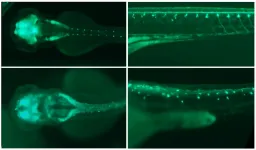Academic journal Polar Science features science in the Arctic
2021-06-01
(Press-News.org) The National Institute of Polar Research (NIPR) publishes Polar Science, a peer-reviewed quarterly journal dealing with polar science in collaboration with the Elsevier B. V.. The most recent issue (Vol. 27 published in March 2021) was a special issue entitled "Arctic Challenge for Sustainability Project (ArCS)," which featured the former national (nation-wide) Arctic research project in Japan. The full text of this issue is freely accessible worldwide for a limited time until 10 September 2021.
The Arctic Research Project "Arctic Challenge for Sustainability (ArCS)" was carried out from September 2015 to March 2020 as a national flagship project funded by the Ministry of Education, Culture, Sports, Science, and Technology (MEXT).
NIPR started dedicated Arctic researches with space and upper atmospheric observation in Scandinavia and Iceland in the early 1980s. By establishing an (international) observatory at Ny-Ålesund, Svalbard, in 1991, NIPR continuously conducts scientific observations for Arctic environment studies through international collaborations. In 2011, a new initiative of the Arctic project was started under the Green Network of Excellence (GRENE), funded by MEXT. The GRENE Arctic Climate Change Research Project was conducted from 2011 to 2016 and had acquired fruitful results, especially on the mechanism of Arctic warming amplification.
As the successor of the GRENE Arctic, the ArCS project was conducted under the leadership of three core institutions, NIPR, Japan Agency for Marine-Earth Science and Technology (JAMSTEC), and Hokkaido University. Under global warming, the surface temperature in the Arctic is increasing with speed more than double the global average, and sea ice extent in the Arctic Ocean is decreasing extensively. The rapid change of the Arctic is affecting not only the natural environment but also human society. Now, in order to tackle these subjects, ArCS was composed of not only natural scientists but also scientists of humanities and social sciences. Coming to the end of the ArCS project, it was intended to summarize the project's achievements as a Special Issue in Polar Science.
This special issue comprises 14 invited articles overviewing the project and additional 22 articles submitted for respective researches. The whole structure of the project was explained by the research note, describing the implementation, supportive activities, and the background of Japanese Arctic research. 13 review articles cover the "International Collaborative Researches," which are composed of 8 themes as follows:
Theme 1: Predictability study on weather and sea-ice forecasts linked with user engagement,
Theme 2: Variations in the ice sheet, glaciers, ocean, climate, and environment in the Greenland region,
Theme 3: Atmospheric climate forcers in the Arctic,
Theme 4: Observational research on Arctic Ocean environmental changes,
Theme 5: Study on Arctic climate predictability,
Theme 6: Response and biodiversity status of the Arctic ecosystems under environmental change,
Theme 7: People and Community in the Arctic Possibility of Sustainable Development
Theme 8: Arctic Data archive System (ADS)
Other 22 articles cover a wide range of topics from the atmospheric sciences, oceanography, glaciology, marine and terrestrial ecosystems, and so on, which belongs to the respective theme above.
You can get a general view of the project by reading through this special issue.
INFORMATION:
About Polar Science
Polar Science is a peer-reviewed comprehensive academic journal relating to the polar regions of the Earth and other planets, which the NIPR began to publish in collaboration with Elsevier B.V. in 2007. The primary purpose of this journal is to inform people about polar science. Currently, more than 150 articles are submitted per year. As a result, this journal is recognized globally as one of the few comprehensive academic journals in the field of polar science. In addition to normal issues, Polar Science publishes a special issue annually on a given topic from various fields.
The main characteristics of Polar Science are summarized as follows.
Polar Science is an international academic journal with an impact factor of 1.389 as of 2019
Polar Science covers 15 disciplines related to the Antarctic and the Arctic such as:
Space and upper atmosphere physics
Atmospheric science/Climatology
Glaciology
Oceanography/Sea ice studies
Geology/Petrology
Solid earth geophysics/Seismology
Marine earth science
Geomorphology/Cenozoic-Quaternary geology
Meteoritics
Terrestrial biology
Marine biology
Animal ecology
Environment
Polar engineering
Humanities and social sciences
Polar Science has an Open Archive whereby published articles are made freely available from ScienceDirect after an embargo period of 24 months from the date of publication.
Printed products are also published.
After Polar Science became an open archive in 2016, the number of article downloads has increased rapidly since then. Currently, more than 140,000 papers are used (PDF download and HTML Views) annually.
ELSE PRESS RELEASES FROM THIS DATE:
2021-06-01
In past studies, researchers have found that C. elegans gonads generate more germ cells than needed and that only half of them grow to become oocytes, while the rest shrinks and die by physiological apoptosis, a programmed cell death that occurs in multicellular organisms. Now, scientists from the Biotechnology Center of the TU Dresden (BIOTEC), the Max Planck Institute of Molecular Cell Biology and Genetics (MPI-CBG), the Cluster of Excellence Physics of Life (PoL) at the TU Dresden, the Max Planck Institute for the Physics of Complex Systems (MPI-PKS), the Flatiron Institute, NY, and the University of California, Berkeley, found evidence to answer the question of what triggers this cell fate decision between life and death in the germline.
Prior studies ...
2021-06-01
Researchers from Trinity College Dublin have developed a novel set of tools for designing vitamin D clinical trials that capture large seasonal and population-wide differences in vitamin D status, typically seen in individuals. Their study published in the journal Scientific Reports (today, Monday 31st May 2021) provides a framework for clinical trials to establish whether vitamin D supplementation is effective against a given disease.
The study also reveals that many trials which failed to find any association between vitamin D and disease prevention may have been underpowered or conducted without enough subjects to detect a benefit of vitamin D.
You can read the full journal paper here: https://go.nature.com/3uERjgO
The ...
2021-06-01
YouTube is a treasure trove of virtual reality fails: users tripping, colliding into walls and smacking inanimate and animate objects. By investigating these "VR Fails" on YouTube, researchers at the University of Copenhagen have sought to learn more about when and why things go sideways for users and how to improve VR design and experiences so as to avoid accidents.
Millions of YouTube viewers have enjoyed hearty laughs watching others getting hurt using virtual reality - people wearing VR headsets, falling, screaming, crashing into walls and TV sets, or knocking spectators to the floor. Some of us have even been that failing someone. Now, videos of virtual reality mishaps, called "VR Fails", ...
2021-06-01
Redox-flow batteries store electrical energy in chemical compounds that are dissolved in an electrolyte. They are a particularly promising alternative to lithium-ion batteries as stationary energy storage. A team headed by Prof. Dr. Ingo Krossing from the Institute of Inorganic and Analytical Chemistry at the University of Freiburg has succeeded in developing a non-aqueous All-Manganese Flow battery (All-MFB) that uses sustainable manganese as its active material and has a long cycle life. The researchers present the results of their work in the latest edition of Advanced Energy Materials.
Active materials are ...
2021-06-01
Energy communities will play a key role in building the more decentralised, less carbon intensive, and fairer energy systems of the future. Such communities enable local prosumers (consumers with own generation and storage) to generate, store and trade energy with each other -- using locally owned assets, such as wind turbines, rooftop solar panels and batteries. In turn, this enables the community to use more locally generated renewable generation, and shifts the market power from large utility companies to individual prosumers.
Energy community projects often involve jointly-owned assets such as community-owned wind turbines or shared battery storage. Yet, this raises the question of how these assets should be controlled - often in real time, and how the energy outputs jointly-owned ...
2021-06-01
Thyroid nodules are a common pathology having a prevalence of 19-76% when screened with ultrasound, with higher frequencies in women. Current medical methods used to assess the malignancy of a nodule consist in performing an ultrasound, followed by a Doppler ultrasound, and then a biopsy. However, unfortunately, these methods present both low specificity and low sensitivity. This insufficient effectiveness in accurately being able to diagnose thyroid tumors leads to many unclear or unnoticed cases as well as many others that undergo unnecessary surgeries (false positives) and increase the cost ...
2021-06-01
When the Augustinian monk Gregor Mendel crossed white-flowering with purple-flowering pea plants in the mid-19th century, he made an interesting discovery: The offspring were all purple. He therefore called this trait dominant, while the white blossom color was recessive. The reason for this phenomenon: In peas, each gene occurs twice. One version comes from the maternal plant and the other from the paternal plant. If a pea has inherited the gene for purple flower color from one parent, but the gene for white flower color from the other, purple wins. Only when two genes for white flowers come together in the offspring plant is it white.
Humans also have genes that are inherited either dominantly or recessively. However, the case is not so clear for the mutations investigated ...
2021-06-01
Using a Fitbit and a spy mic, scientists have discovered new insight into the behaviour of the elusive Canada lynx. A new study by researchers from McGill University, University of Alberta, and Trent University provides a first look at how miniaturized technology can open the door to remote wildlife monitoring.
"Working on one of the boreal forest's top predators, the Canada lynx, we found that two different technologies, accelerometers and audio recording devices, can be used to remotely monitor the hunting behaviour of predators, even documenting the killing of small prey," says lead author Emily Studd, a Postdoctoral Fellow under the supervision of Murray Humphries at McGill University and Stan Boutin at University ...
2021-06-01
The University of Ottawa's Positive Energy program released new survey results showing that a large segment of the Canadian public does not trust the courts to settle disputes over energy projects or climate policy. The survey was conducted by Positive Energy's official pollster, Nanos Research.
Canadians were asked: On a scale of 0 to 10, where 0 means do not trust at all and 10 means trust completely, how much do you trust the courts to settle disputes over government decisions on energy projects? They were asked the same question for climate policy. The results are very similar. Only one in three Canadians trust the courts to settle disputes over energy projects or climate policy (answering between 7 and 10: 31% for energy, 30% for ...
2021-06-01
Machine learning, when used in climate science builds an actual understanding of the climate system, according to a study published in the journal Chaos by Manuel Santos Gutiérrez and Valerio Lucarini, University of Reading, UK, Mickäel Chekroun, the Weizmann Institute, Israel and Michael Ghil, Ecole Normale Supérieure, Paris, France. This means we can trust machine learning and further its applications in climate science, say the authors. The study is part of the European Horizon 2020 TiPES project on tipping points in the Earth system. TiPES is administered from the University of Copenhagen, Denmark.
Man or ...
LAST 30 PRESS RELEASES:
[Press-News.org] Academic journal Polar Science features science in the Arctic







